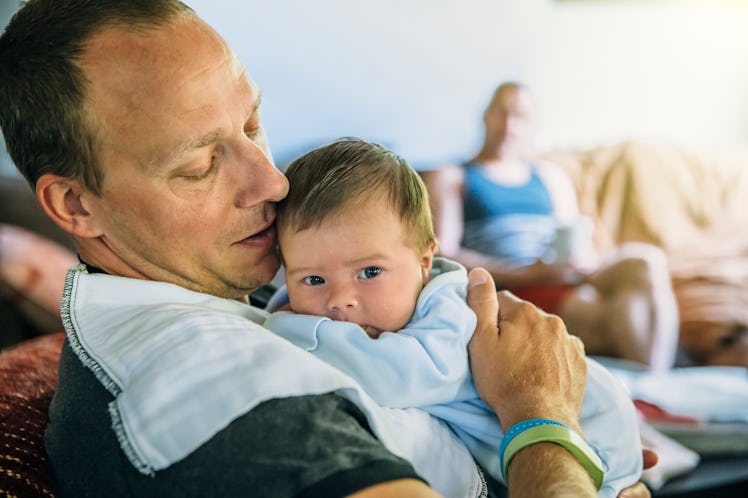When Can You Stop Burping A Baby? A Nurse Explains
4 to 6 months is a good rule of thumb, but these are the specific signs to look for.

A baby’s early days are typically spent cycling through three activities: eating, pooping, and sleeping. And when something disturbs their flow through these three, they cry. During feeding, gas is particularly upsetting to babies, which is why they typically require burping for relief from pain and discomfort. But at some point, babies age out of burping. So when can you stop burping a baby?
When To Stop Burping A Baby
Newborns have underdeveloped esophageal sphincters — bands of muscles at the top and bottom of the esophagus that regulate the passage of food, saliva, and gas in and out of the stomach. “In young babies, this muscle doesn’t always spontaneously relax when gas needs to pass,” says Carole Kramer Arsenault, R.N., founder of newborn care service Boston Baby Nurse & Nanny and author of Newborn 101. “As a result, air is swallowed during feeding. And if this isn’t released as a burp, it makes its way to the baby’s intestines, which usually causes pain.”
So when your baby gets squirmy and fussy at the end of a feeding, it’s not a complaint about the meal itself. They’re just uncomfortable because of all the air in their belly. That’s why the American Academy of Pediatrics (AAP) recommends regularly burping your baby during feeding breaks and when they’re done eating. The AAP suggests trying to burp babies when switching breasts if breastfeeding, or every two to three ounces if bottle-feeding. Soon enough, burping will become a rhythmic part of each feeding, and you’ll be able to read even the slightest signals that your baby is uncomfortable.
Eventually, parents will notice signs that their baby isn’t experiencing discomfort during and after feedings, which indicates that their baby’s esophagus and coordination have matured to the point that burping is unnecessary because they aren’t swallowing air anymore. “Every baby is different, but the esophagus is usually fully developed by 4 to 6 months of age,” Arsenault says.
Granted, parents can’t get visual confirmation of esophageal maturity, so monitoring external signs that your baby doesn’t need help burping anymore will have to suffice. When a baby can feed without fussing or is ready to play immediately after they eat, you can stop burping them. And even if your baby is still swallowing some air, hitting developmental milestones like the ability to sit up and roll over may allow them to resolve gas issues without assistance.
Until your baby has grown out of the need for burping, there are some things parents can do to make feedings go more smoothly. Using a newborn-sized nipple top when bottle-feeding can slow the milk flow and prevent them from gulping so much air. And breastfed babies may get especially fussy when their moms eat certain foods. Dairy products and cruciferous vegetables like broccoli are the usual suspects. Eating less foods that are prone to causing gas in adults can, in turn, significantly reduce gas in breastfed babies.
Tips For Burping A Baby
Burping isn’t always easy, and it isn’t always necessary either. It’s entirely possible that your baby has a smooth feeding or consistently creates a tight suction that prevents them from swallowing air. Continued attempts to burp your baby when they simply don’t need relief can become stressful for everyone involved.
“You never want to force a burp. If your baby doesn’t burp within 10 minutes, they likely don’t need one,” Arsenault says.
It’s stressful to burp a fussy baby, but Arsenault encourages parents to stay calm when it’s clear their baby does need to burp but is having difficulty finding relief. Getting worked up when you can’t alleviate your baby’s discomfort is an understandable reaction, but it sets off a cycle of agitation. “Stressing out transfers bad energy to the baby and makes for an unpleasant experience,” she says.
And although nearly every baby on TV is burped with pats on the back while their head is over the shoulder of whoever is holding them, other techniques may work better. Burping over the shoulder can be especially difficult for newborns since they require so much support to stay upright. Instead, lightly pat or rub the baby’s back while they’re lying belly-down across your lap. Or place them on their back and gently pump their legs in a bicycle motion — this will release the gas via the basement instead of the attic.
Burping doesn’t have to feel like a chore. Consider it part of the feeding process, with all of the bonding and attachment opportunities that come with meeting a baby’s needs. As you pay attention to what works and what doesn’t for your child, you’ll continue to become attuned to their most subtle signals, like the little grins of relief they flash when you alleviate their gas pains. And the less subtle looks of surprise when those monster belches escape.
So soak up those warm fuzzies because there will soon come a time when your kid’s burps will become far more intentional and much less endearing.
This article was originally published on